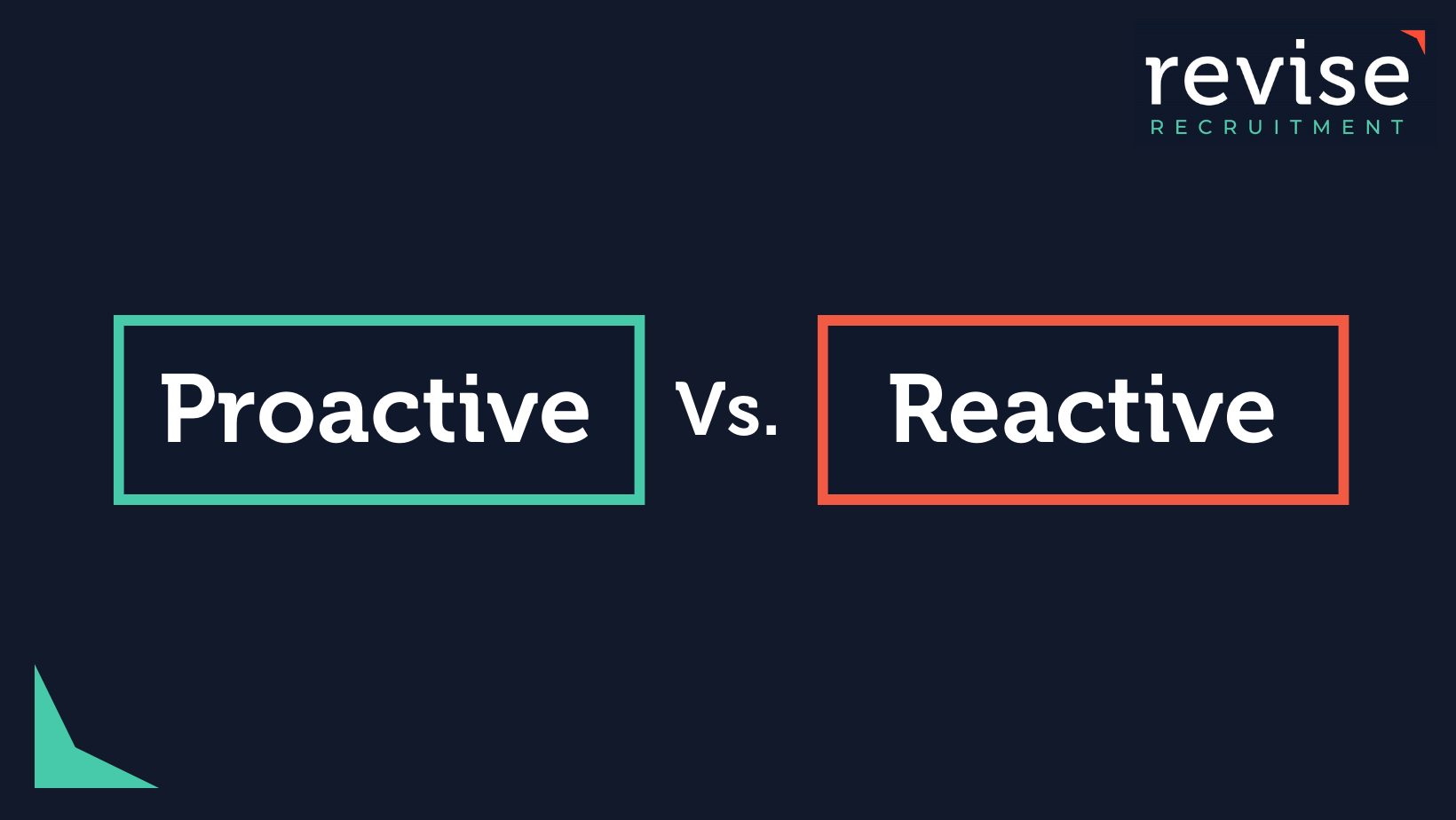
Proactive Vs. Reactive Recruitment: Why Planning Ahead Matters
There was a time early in my career when I found myself caught in the whirlwind of reactive recruitment. An unexpected departure from a key role left our team scrambling. We were underprepared and stressed, trying to find a quick replacement. The experience was eye-opening, making me realise the undeniable value of being a step ahead in the recruitment game. So, as we explore the impact of proactive versus reactive recruitment, I want to share insights from that experience and the lessons learnt that shaped the ethos of Revise Recruitment.
Simply put, reactive recruitment is the scramble to fill an unexpected vacancy, while proactive recruitment is the art of preparing for vacancies before they even happen. Of course, life has its own plans sometimes, and reactive recruitment can be unavoidable. The point isn’t to criticise, but rather to offer a balanced perspective so that wherever possible, we all try to be proactive in our recruitment efforts. Let’s dive in!

The Reactive Recruitment Approach
Reactive recruitment is precisely as it sounds: a reaction. It’s a response to an immediate and unforeseen hiring need. Companies often find themselves resorting to this method when there’s a sudden job opening, typically due to an unexpected resignation or a quick company expansion that wasn’t adequately planned for, which sometimes can’t be helped, and we’ll always be on hand for those times!
Challenges with Reactive Recruitment
- Time Pressure: When you’re racing against the clock, there’s a risk of making hasty decisions. The need to fill a position urgently can sometimes overshadow the importance of finding the right fit. You might end up with a candidate who ticks all the boxes on paper but isn’t quite right for the company culture or the specifics of the role.
- Missing Out on Great Candidates: Oftentimes the best candidates in the market aren’t the ones actively looking for a job; they’re the ones who are happily employed elsewhere and might only be tempted to move for an exceptional opportunity. Reactive recruitment means you’re only seeing a slice of the talent pie – and it’s not always the best slice.
- Cost Implications: The saying “time is money” rings especially true here. Rushed processes can mean higher advertising fees, potential training costs for less-than-ideal candidates, and, in the worst-case scenario, the costs associated with high turnover rates if those hastily hired candidates don’t work out.
Reflecting on my own experience and the challenges faced at that time, it’s clear that while reactive recruitment might sometimes be inevitable, it isn’t optimal. But what’s the alternative?
The Power of Proactive Recruitment
Proactive recruitment is about anticipation and forward-thinking. Instead of waiting for an empty desk or a notice letter, proactive recruiters are continually cultivating a rich pool of potential candidates. This approach is strategic, allowing companies to map out future hiring needs and align them with their growth strategies.
Benefits of Proactive Recruitment
- Access to a Broader Candidate Pool: By being proactive, you tap into a wide network of potential candidates, including those passive candidates who are not actively looking but might be interested in an excellent opportunity.
- Better Cultural Add: With more time and a broader selection of candidates, you can prioritise finding individuals who align perfectly with your company’s values and culture, ensuring longer retention and greater job satisfaction.
- Cost Efficiency: Proactive recruitment can lead to substantial cost savings. By reducing the time roles are vacant and decreasing turnover rates, you can save on training costs, recruitment fees, and potential lost revenue from having critical roles unfilled.
- Strengthened Employer Brand: A well-organised recruitment process reflects positively on your company, enhancing your reputation as a desirable place to work. When candidates experience a streamlined, efficient, and thoughtful recruitment process, word spreads, and your employer brand strengthens.
How Revise Recruitment Embodies Proactivity
At Revise Recruitment, our guiding principle has been to anticipate, not just react. We commit ourselves to a deep understanding of the sectors we serve. It’s through building meaningful relationships and actively engaging with our expansive network that we remain prepared for our clients’ evolving needs.
Transitioning from a reactive to a proactive recruitment stance has undeniable merits, and I’ve seen first-hand how this positively impacts not just recruitment but the entire organisational ecosystem. Stability, growth, and an enriched work culture often follow when a proactive strategy is embraced. At Revise, we consider ourselves more than just recruiters; we’re facilitators for future growth, always planning for what comes next.
So while we explore the benefits of proactive recruitment, it’s worth acknowledging that sometimes life throws curveballs. Reactive recruitment will always have its place for those unexpected moments, and rest assured, we’re fully equipped to support you in those instances as well. The key is to strive for a balance, minimising the reactive where we can, without dismissing its occasional necessity.
7 Practical Steps to Champion Proactive Recruitment
#1 Mapping Out Future Hiring Needs
Before you can be proactive, you must have a roadmap. Collaborate closely with department heads and team leaders to identify potential future hiring needs. While it’s impossible to foresee every vacancy, planning for anticipated growth or changes can give you a head start.
#2 Building and Maintaining Candidate Pools
 Continuously cultivate relationships with potential candidates. Whether through industry events, networking sessions, or social media platforms like LinkedIn, always be on the lookout for candidates that align with your company’s values and needs. Even if there’s no immediate vacancy, keeping a curated list of potential hires can speed up the recruitment process when the time comes.
Continuously cultivate relationships with potential candidates. Whether through industry events, networking sessions, or social media platforms like LinkedIn, always be on the lookout for candidates that align with your company’s values and needs. Even if there’s no immediate vacancy, keeping a curated list of potential hires can speed up the recruitment process when the time comes.
#3 Engaging Passive Candidates
Not every potential candidate is actively seeking a new role. Sometimes, the best people are content where they are – but that doesn’t mean they’re not open to new opportunities. Regular check-ins, casual coffee catch-ups, or even just sharing industry news can keep you on their radar.
#4 Investing in Employer Branding
In a proactive recruitment strategy, it’s crucial that potential candidates are as interested in you as you are in them. Ensure your company is seen as a desirable place to work. This isn’t just about salary packages and perks; it’s about company culture, opportunities for growth, and having a reputation for valuing employees.
#5 Leveraging Technology
Modern recruitment software can do more than just track applicants; it can predict hiring needs, analyse the success of recruitment channels, and even flag potential candidates based on your criteria. Investing in such technology is investing in a proactive approach.
#6 Working Closely with Recruitment Agencies
A recruitment agency, especially one as dedicated as Revise Recruitment, is a partner in your proactive recruitment journey. We’re not just here for when you have a vacancy; we’re here to understand your business, and its future trajectory, and to help you prepare for it. By integrating us into your strategic planning, you tap into a reservoir of expertise and industry insight.
#7 Continuous Learning and Adaptation
The recruitment landscape is always evolving. Being proactive means staying informed. Regularly review and tweak your strategies based on results and the latest industry developments. What worked last year might not be as effective now. Stay agile, stay informed, and be ready to adapt.
Proactive recruitment is more than a strategy; it’s a mindset shift. It’s about moving from filling vacancies to cultivating a dynamic and thriving workforce that’s always ready for the future. It’s not just about the right role or the perfect candidate today; it’s about envisioning and preparing for the successes of tomorrow.
Shaping Tomorrow’s Success Stories Today
In the fast-paced world of recruitment, being proactive isn’t just an advantage – it’s a necessity. By actively planning for the future, nurturing candidate pipelines, and embracing innovative strategies, businesses can sidestep the pitfalls of reactive recruitment. They can secure the best people before there’s even a role to fill, ensuring a seamless alignment between organisational goals and the individuals who will help achieve them.
For myself, this forward-thinking approach is not just a business tactic; it’s a philosophy. It speaks to our commitment to understanding, anticipating, and serving the needs of both candidates and clients. Being proactive is about valuing long-term success over short-term fixes. It’s about forging meaningful connections, nurturing relationships, and crafting a future where every hire is a perfect fit.
That said, we recognise that sometimes life throws curveballs, and reactive recruitment becomes unavoidable. In those instances, rest assured that Revise Recruitment is still your go-to partner, well-equipped to support your immediate needs.
 To those companies and recruiters looking to revolutionise their recruitment processes: now is the time. Embrace proactivity, engage with dedicated recruitment partners like Revise, and be part of the few shaping the future of recruitment. After all, the best way to predict the future is to create it. Let’s start creating yours, together.
To those companies and recruiters looking to revolutionise their recruitment processes: now is the time. Embrace proactivity, engage with dedicated recruitment partners like Revise, and be part of the few shaping the future of recruitment. After all, the best way to predict the future is to create it. Let’s start creating yours, together.
Contact Louise@reviserecruitment.com.au today for more information!
Get in Touch
"*" indicates required fields
"*" indicates required fields